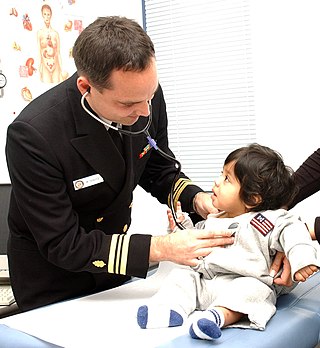
Health economics is a branch of economics concerned with issues related to efficiency, effectiveness, value and behavior in the production and consumption of health and healthcare. Health economics is important in determining how to improve health outcomes and lifestyle patterns through interactions between individuals, healthcare providers and clinical settings. In broad terms, health economists study the functioning of healthcare systems and health-affecting behaviors such as smoking, diabetes, and obesity.

A nursing home is a facility for the residential care of elderly or disabled people. Nursing homes may also be referred to as care homes, skilled nursing facilities (SNF) or long-term care facilities. Often, these terms have slightly different meanings to indicate whether the institutions are public or private, and whether they provide mostly assisted living, or nursing care and emergency medical care. Nursing homes are used by people who do not need to be in a hospital, but cannot be cared for at home. The nursing home facility nurses have the responsibilities of caring for the patients' medical needs and also the responsibility of being in charge of other employees, depending on their ranks. Most nursing homes have nursing aides and skilled nurses on hand 24 hours a day.
The Bachelor of Science in Nursing also known in some countries as a Bachelor of Nursing (BN) or Bachelor of Science (BS) with a Major in Nursing is an academic degree in the science and principles of nursing, granted by an accredited tertiary education provider. The course of study is typically three or four years. The difference in degree designation may relate to the amount of basic science courses required as part of the degree, with BScN and BSN degree curriculums requiring completion of more courses on math and natural sciences that are more typical of BSc degrees and BN curriculums more focused on nursing theory, nursing process, and teaching versions of general science topics that are adapted to be more specific and relevant to nursing practice. Nursing school students are generally required to take courses in social and behavioral sciences and liberal arts, including nutrition, anatomy, chemistry, mathematics, and English. In addition to those courses, experience in physical and social sciences, communication, leadership, and critical thinking is required for a bachelor's degree. BSN programs typically last 2–4 years. Someone who holds a BSN can work in private or public medical and surgical hospitals, physician's offices, home health care services, and nursing facilities. Having a BSN can result in more opportunities and better salary than just an associate degree.
The School of Nursing is the graduate school of nursing at Columbia University in the Washington Heights neighborhood of Manhattan, New York City. Founded in 1892, it stands as one of the oldest nursing schools in the United States.

An oncology nurse is a specialized nurse who cares for cancer patients. These nurses require advanced certifications and clinical experiences in oncology further than the typical baccalaureate nursing program provides. Oncology nursing care can be defined as meeting the various needs of oncology patients during the time of their disease including appropriate screenings and other preventive practices, symptom management, care to retain as much normal functioning as possible, and supportive measures upon end of life.
Nursing ethics is a branch of applied ethics that concerns itself with activities in the field of nursing. Nursing ethics shares many principles with medical ethics, such as beneficence, non-maleficence and respect for autonomy. It can be distinguished by its emphasis on relationships, human dignity and collaborative care.

A nurse practitioner (NP) is an advanced practice registered nurse and a type of mid-level practitioner. NPs are trained to assess patient needs, order and interpret diagnostic and laboratory tests, diagnose disease, formulate and prescribe medications and treatment plans. NP training covers basic disease prevention, coordination of care, and health promotion, but does not provide the depth of expertise needed to recognize more complex conditions.
A Master of Science in Nursing (MSN) is an advanced-level postgraduate degree for registered nurses and is considered an entry-level degree for nurse educators and managers. The degree also may prepare a nurse to seek a career as a nurse administrator, health policy expert, or clinical nurse leader. The MSN may be used as a prerequisite for doctorate-level nursing education, and used to be required to become an advanced practice registered nurse such as a nurse practitioner, clinical nurse specialist, nurse anesthetist, or nurse midwife.
An Associate of Science in Nursing (ASN) is a tertiary education nursing degree which typically takes 2–3 years to complete. In the United States, this type of degree is usually awarded by community colleges or similar nursing schools. Some four-year colleges also offer this degree. Students awarded an Associate of Science in Nursing are qualified to sit for the NCLEX-RN and apply for licensure as a Registered Nurse.
Nigerian Baptist Convention is a Baptist Christian denomination, affiliated with the Baptist World Alliance, in Nigeria. The office headquarters is in Ibadan, Nigeria. Rev. Dr. Israel Adélaní Àkànjí MFA is the president.

The Canadian Nurses Association (CNA), known in French as the Association des infirmières et infirmiers du Canada (AIIC), is the national professional association representing registered nurses, nurse practitioners, licensed and registered practical nurses, registered psychiatric nurses and retired nurses across all 13 provinces and territories in Canada. CNA advances the practice and profession of nursing to improve health outcomes and strengthen Canada's publicly funded, not-for-profit health system. CNA represents Canadian nursing to other organizations and to governments nationally and internationally. It gives nurses a strong national association through which they can support each other and speak with a powerful, unified voice. It provides nurses with a core staff of nursing and health policy consultants and experts in other areas such as communications and specialty certification. CNA's active role in legislative policy influences the health care decisions that affect nursing professionals every day. It has published a large number of documents, including the Code of Ethics for Registered Nurses.
Nursing management consists of the performance of the leadership functions of governance and decision-making within organizations employing nurses. It includes processes common to all management like planning, organizing, staffing, directing and controlling. It is common for registered nurses to seek additional education to earn a Master of Science in Nursing or Doctor of Nursing Practice to prepare for leadership roles within nursing. Management positions increasingly require candidates to hold an advanced degree in nursing.
The National League for Nursing (NLN) is a national organization for faculty nurses and leaders in nurse education. It offers faculty development, networking opportunities, testing services, nursing research grants, and public policy initiatives to more than 40,000 individual and 1,200 education and associate members.
Cultural safety is the effective nursing practice of nursing a person or family from another culture; it is determined by that person or family. It developed in New Zealand, with origins in nursing education. An unsafe cultural practice is defined as an action which demeans the cultural identity of a particular person or family.
Institutional ethnography (IE) is an alternative approach of studying and understanding the social. IE has been described as an alternative philosophical paradigm, sociology, or (qualitative) research method. IE explores the social relations that structure people's everyday lives, specifically by looking at the ways that people interact with one another in the context of social institutions and understanding how those interactions are institutionalized. IE is best understood as an ethnography of interactions which have been institutionalized, rather than an ethnography of specific companies, organizations or employment sectors, which would be considered industrial sociology or the sociology of work. For the institutional ethnographer, ordinary daily activity becomes the site for an investigation of social organization. IE was first developed by Dorothy E. Smith as a Marxist feminist sociology "for women, for people"; and is now used by researchers in social sciences, education, nursing, human services and policy research as a method for mapping the translocal relations that coordinate people's activities within institutions.
The Australian College of Nursing (ACN) is the peak professional body and voice for the nursing profession in Australia. ACN advocates, develops policy, and provides education to advance the status, recognition, and respect for nursing nationally and internationally.

Springer Publishing Company is an American publishing company of academic journals and books, focusing on the fields of nursing, gerontology, psychology, social work, counseling, public health, and rehabilitation (neuropsychology). It was established in 1951 by Bernhard Springer, a great-grandson of Julius Springer, and is based in Midtown Manhattan, New York City.

Nursing is a profession within the healthcare sector focused on the care of individuals, families, and communities so they may attain, maintain, or recover optimal health and quality of life. Nurses may be differentiated from other healthcare providers by their approach to patient care, training, and scope of practice. Nurses practice in many specialties with differing levels of prescription authority. Nurses comprise the largest component of most healthcare environments; but there is evidence of international shortages of qualified nurses. Nurses collaborate with other healthcare providers such as physicians, nurse practitioners, physical therapists, and psychologists. Unlike nurse practitioners, nurses typically cannot prescribe medications in the US. Nurse practitioners are nurses with a graduate degree in advanced practice nursing. They practice independently in a variety of settings in more than half of the United States. Since the postwar period, nurse education has undergone a process of diversification towards advanced and specialized credentials, and many of the traditional regulations and provider roles are changing.
Ambulatory care nursing is the nursing care of patients who receive treatment on an outpatient basis, ie they do not require admission to a hospital for an overnight stay. Ambulatory care includes those clinical, organizational and professional activities engaged in by registered nurses with and for individuals, groups, and populations who seek assistance with improving health and/or seek care for health-related problems. The American Academy of Ambulatory Care Nursing (AAACN) describes ambulatory care nursing as a comprehensive practice which is built on a broad knowledge base of nursing and health sciences, and applies clinical expertise rooted in the nursing process.






